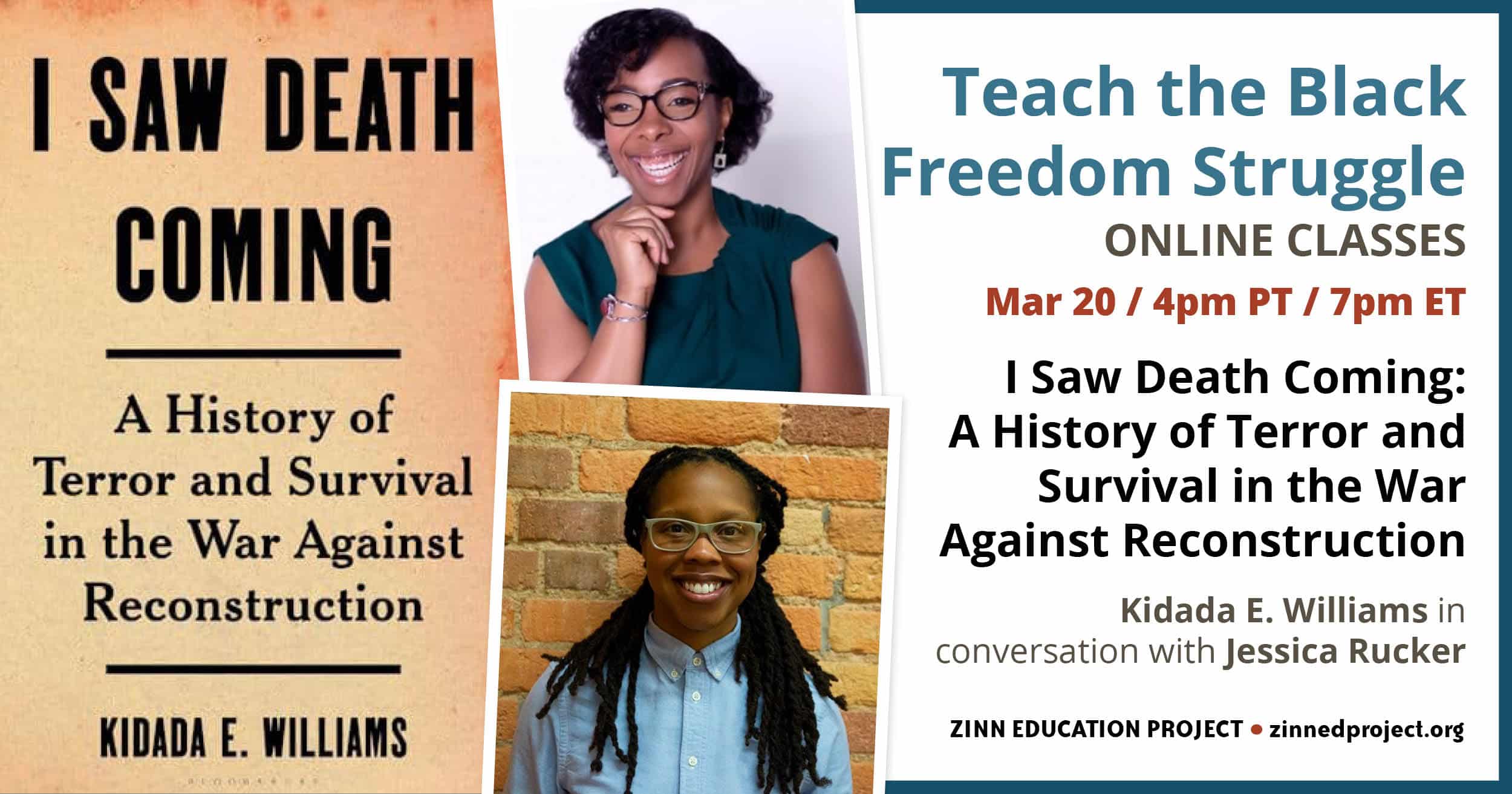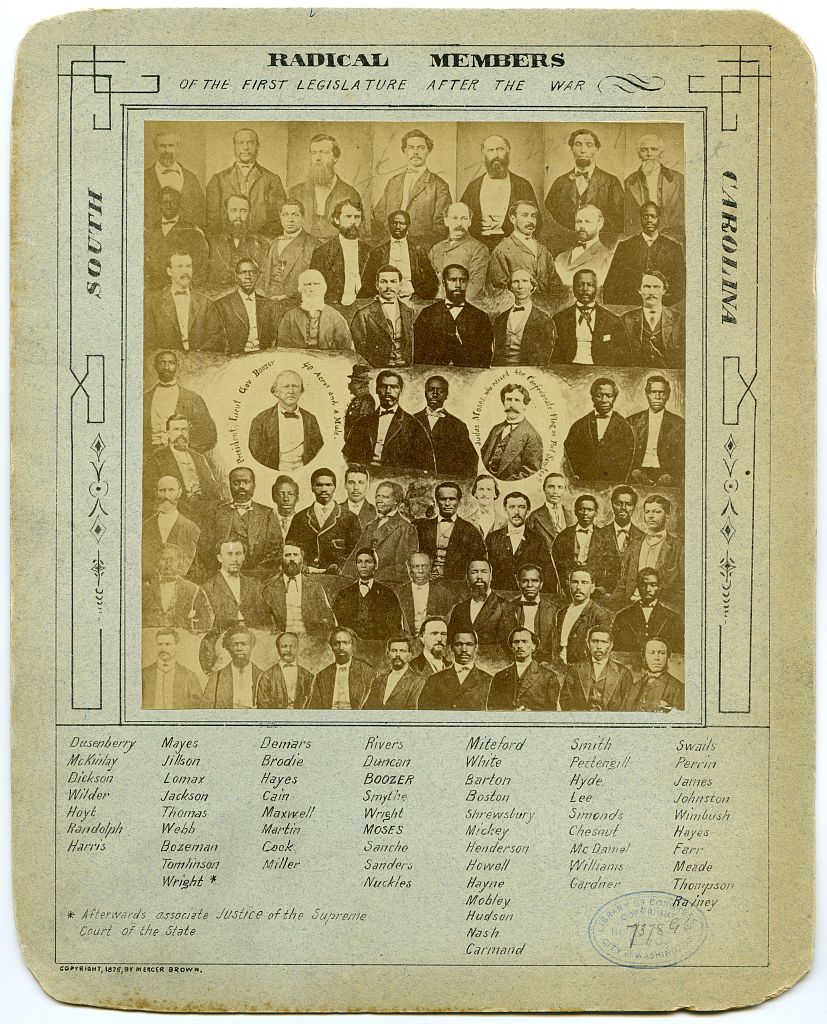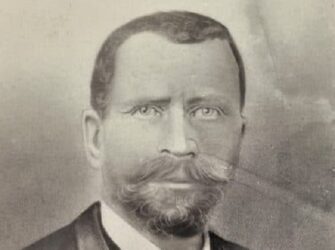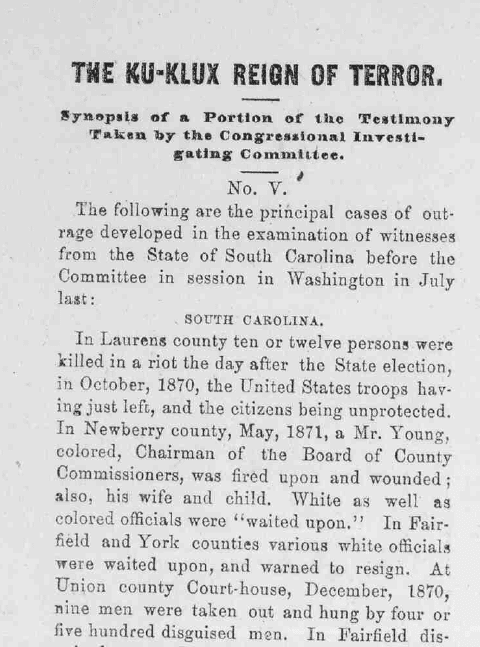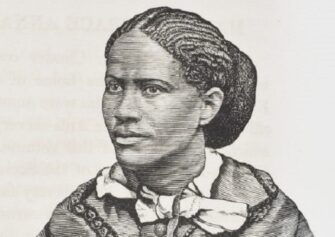On March 20, 2023, historian Kidada Williams joined Prentiss Charney Fellow Jessica Rucker to discuss her latest book, I Saw Death Coming: A History of Terror and Survival in the War Against Reconstruction, a breakthrough account of the era that transports readers into the daily existence of formerly enslaved people and the white supremacist terror they faced after emancipation.
This session was the third time that Dr. Williams has participated in our monthly Teach the Black Freedom Struggle online class series. Don’t miss the spring lineup — register now.
Participants shared what they learned and additional reflections on the session:
We covered so much that I need time to process, but what immediately stands out is how important it is to research our own ancestry, collect stories of our elders, and document and leave our own stories and records!
Bearing witness to the violence was critical to African-American sense of dignity and self; Black folks have documented their experiences and we need to have a nuanced and complex understanding of violence so that we can understand resistance.
“Imprecision is an act of erasure.” I appreciated learning about the testimonies that highlight the heart of the freedom movement and “who failed to do what,” underscoring the importance of teaching the truth.
The story of Eliza Lyons was very powerful. Also the idea that this evidence of trauma from Reconstruction has been sitting in the sources, but it takes an open mind and a new lens of studying history to be able to look at the evidence and frame it in a way that makes sense to a modern audience with a modern lens of studying the effects of trauma.
The need for historians to connect with K–12 teachers, to not simply write and produce historical accounts but to partner with teachers to share those stories. Our group discussed teaching from the primary sources based on Dr. Williams’ talk. Also the idea that Black education has not always happened in the classroom and we need to understand that and support both alternative learning spaces like the home/community and the classroom.
Whew, everything was quotable! I was struck by the talking points related to white supremacy and what violence seeks to achieve. Also, how they have taken sides with teaching white supremacist lies — we will not be distracted!
Today’s event was passionate, informative, and empowering. I am honored to have had the chance to listen in, get some insight into Dr. Williams’ methodologies, and thoughts about what and how to position our teaching and learning.
So much gratitude for you all, this programming, and to be part of this learning community.
Event Recording
Recording of the full session, except for the breakout rooms.
Audiogram
In this audiogram, historian Kidada Williams discusses the significance of bearing witness to the injustice and violence of white supremacy during the Reconstruction era.
Resources
Many of the lessons, books, reports, and podcasts recommended by the presenters and participants.
Lessons
Books
Reports
Podcasts
This Day In History
The dates below come from our This Day in History collection, which contains hundreds of entries all searchable by date, state, theme, and keyword(s).
Participant Reflections
With more than 240 attendees, polls showed attendees were 48% K–12 teachers, 11% teacher educators, 8% historians, and 8% family members of a student. Below are more comments that participants shared in their end-of-session evaluations.
What was the most important thing (story, idea) you learned today?
The most important thing that I learned today is that there is an abundance of primary sources that tell the narrative of Reconstruction that have been hidden from us, and that if we read the testimony at Klan trials, documented narratives, etc., we will see the truth revealed.
Teachers need to evaluate the type of history they are teaching. Whose history? Bring in primary sources to tell the story of Reconstruction.
Choose your side, stick to your position, be assertive and don’t let the supremacist games get to you. Understand the levels and the complexities of violence. Reconstruction is not over; it is still happening. Who gets to talk about trauma, and how does trauma get talked about? Who failed, or is failing, Reconstruction? Educators need to move away from sanitized history. And finally, new technologies can make learning and teaching accurate histories — especially hard histories — more possible due to the new accessibilities that have come along with new technologies.
The importance of reading primary sources from the lens of trauma and how that informs the narrative of Black families and the erasure they have experienced.
Teachers take sides in the language they use.
The importance of precision with my words and language. When the correct language is not used it is an act of erasure.
Reconstruction didn’t fail: Who failed to do what? Stop pretending that teachers are not taking sides. What is violence used to achieve?
The most important thing I learned was how critical it is to understand that violence comes in many forms — physical, emotional, economic. And not just understanding and teaching about that violence but getting students to recognize the goals of said violence.
How the narratives can help students understand more deeply the experience of Reconstruction. Teaching it can help counter the racist idea that Black people didn’t do enough.
It’s important to record your history as you are living it. There are stories to be told. While it may seem insignificant to us now, it is our first hand account and the legacy that we leave.
What will you do with what you learned?
Use the primary sources strategically, especially those that document and center Black voices, because they tell us a lot about what was going on during Reconstruction.
I am absolutely stealing questions that Jessica brought up about the role of Black people to bear witness to the truths of what happened to them: :”What do they want by testifying? How does the nation respond and why? What does this tell us about the nation and what does this tell us about African Americans?”
I plan to utilize all of this richness in my own community in Texas and continue to have these conversations with my own children and grandchildren so that they can be best educated outside of the classroom and know what is off with the educational system.
I will use some of the reframing questions of “Who failed to do what?” and “What was the violence aiming to achieve?” in discussions around Reconstruction.
I connected with an educator and plan to volunteer and participate at the school board level.
I will be including Dr. Williams’ wonderful new book in a book event I’m running next month with undergraduate students, and this event helped to open my understanding of the book and the invaluable research — all of which I will also personally be incorporating in my future endeavors as an educator.
Absolutely share this knowledge with others and continue broadening the scope of hard history with my children.
I support educators at the district level in a capacity not directly related to curriculum and instruction. However, I collaborate with many who do. As a white educator, I am trying to build on my own knowledge base so I become grounded and can speak confidently about the true history about Reconstruction and advocate for it to be a part of our learning community at all levels.
I am a librarian and I will use this information every chance I get when I approach someone who supports the idea of removing Black history, is not woke, or is acting out as white fragility, etc.
Centering Reconstruction around the story of those making the most of freedom and how it could be taken away in an instant.
I’m a teacher of teachers in museum education. This experience helps solidify my work in encouraging museum teachers to develop programming that expands the opportunities for all visitors and participants to learn and engage with the truth of U.S. history.
I will share these resources with teachers and add to class curricula.
Continue to add the personal narratives to my high school curriculum, and keep reminding my students to ask for the stories they feel they aren’t hearing enough of, to hear the voices they know should be represented.
Presenters
Kidada E. Williams is the author of I Saw Death Coming: A History of Terror and Survival in the War Against Reconstruction and They Left Great Marks on Me: African American Testimonies of Racial Violence from Emancipation to World War I. She teaches courses on African American and U.S. history and historical research methods at Wayne State University. Williams is also one of the co-developers of #CharlestonSyllabus, a crowd-sourced project that helped people understand the historical context surrounding the 2015 racial massacre at Charleston’s Emanuel AME Church.
Jessica Rucker is a graduate student in the Department of American Studies at the University of Maryland, College Park, and a Prentiss Charney Fellow. Prior to her graduate work, she was a high school teacher in Washington, D.C.
